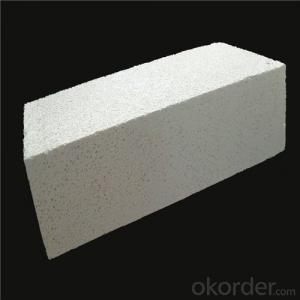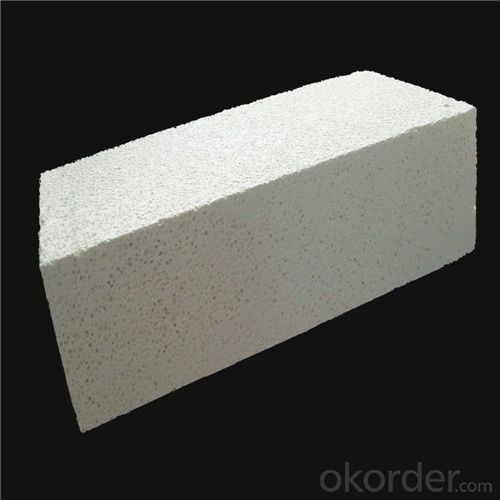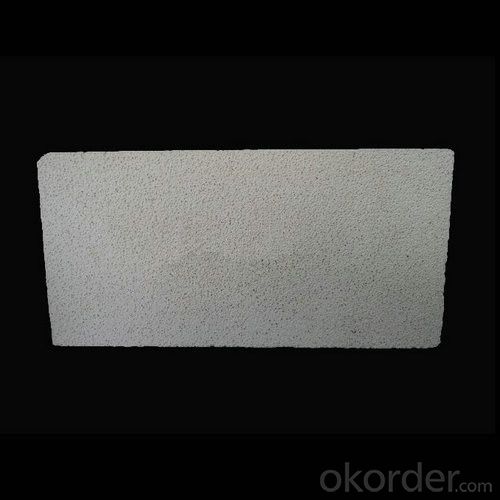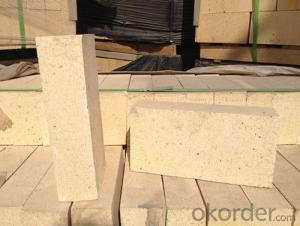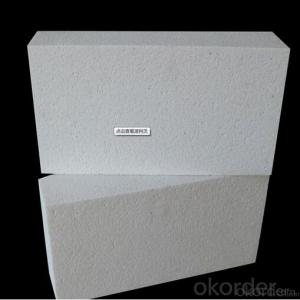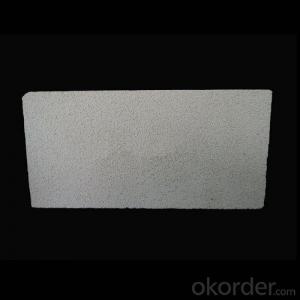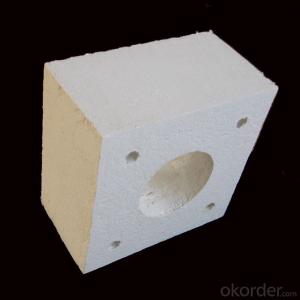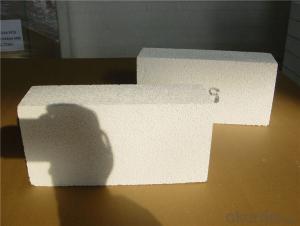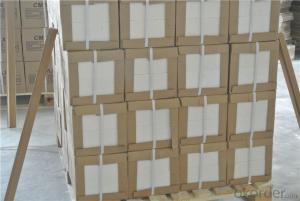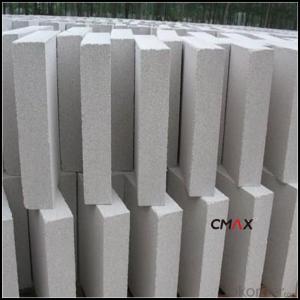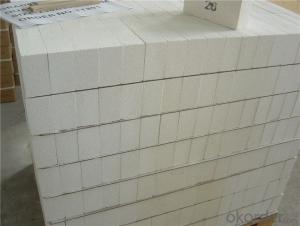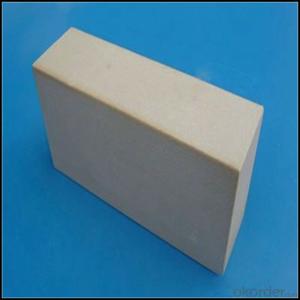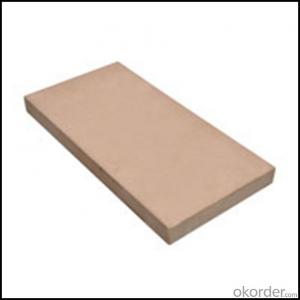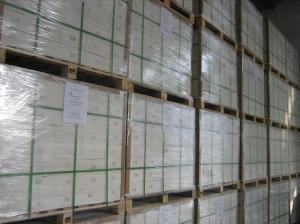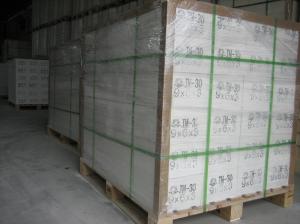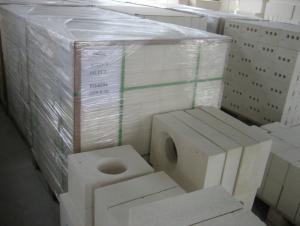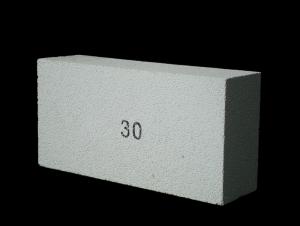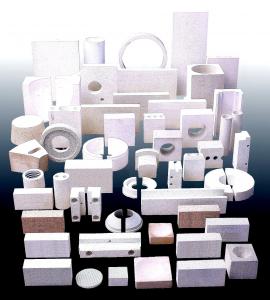Insulating Fire Bricks - High Quality Refractory Clays with Excellent Thermal Insulation
- Loading Port:
- Shanghai
- Payment Terms:
- TT OR LC
- Min Order Qty:
- 1 m.t.
- Supply Capability:
- 1000000 m.t./month
OKorder Service Pledge
OKorder Financial Service
You Might Also Like
Refractory clays insulating firebricks/good thermal insulation bricks:are made of Mullite material in good purity.In order to meet the thermal and physical requirements,we produce BJM insulating firebricks into several grades through the addtion of alumina.And we also add some material (which will burns out) to get the pole structure which is helpful for the heat thermal. This kind product used for oven/ furnace and some equipments working in high temperature by back-up insulation behind other refractories.The production of these goods are strictly in size and quality.
Advantages of Refractory clays insualting firebricks/good thermal insulation bricks:
• Made of high pure material,light weight • Color pure white • Good thermal conductivity • Great thermal shock resistance • very good volume stability at high temperature |
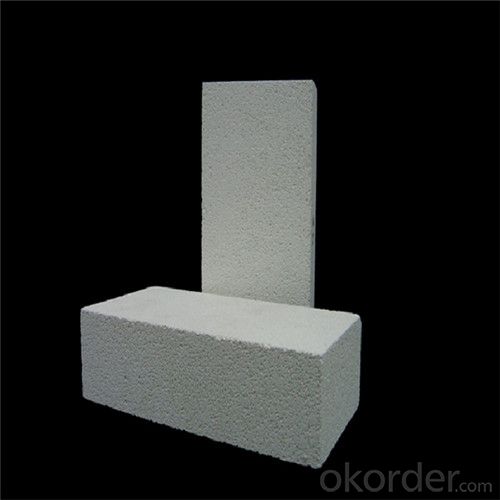
Teachnical Date sheet ofRefractory clays insulating firebricks
/good thermal insulation bricks:
| Grade | Density(kg/m3) | Cold crushing strenth(Mpa) | Thermal Conductivity(400°c/600°c) | AL2O3 | SiO2 | Fe2O3≤% | Linear change≤% | Thermal shock resistance times |
| BJM23 | 600 | 1.2 | 0.18/0.20 | 41 | 54 | 1 | 1250*12/0.5 | >20 |
| BJM26 | 800 | 1.6 | 0.25/0.30 | 55 | 41 | 0.8 | 1400*12/0.5 | >20 |
| BJM28 | 900 | 2.0 | 0.33/0.35 | 65 | 31 | 0.7 | 1500*12/1.0 | >20 |
| BJM30 | 1000 | 2.5 | 0.40/0.42 | 73 | 25 | 0.7 | 1600*12/1.0 | >20 |
| BJM32 | 1200 | 2.8 | 0.45/0.50 | 76 | 20 | 0.8 | 1650*12/1.0 | >20 |
Application
Refractory clays insulating firebricks/good thermal insualtion bricks:
• Backup lining for fireclay brick and high alumina brick in boilers,ceramic kiln,reheating furnace,glass furnace,periodic kiln and high efficiency incinerators,etc. • Backup lining of cyclone preheaters and cooler in cement plant,hot gas generator,hot air direat stack and floor lining for kiln car,etc. |
FAQ
Q4: What is the minimum quantity?
A4: There is no minimum order quantity. Depending on the item and processing, there may be a minimum production required, however we can offer a quotation based only on the quantity you need.
Q5: Can you give me a brief introduction of the application of your products?
A5: CNBM (China National Building Material) core refractory business comprises the production, sale and installation of high-grade refractory products, the development and implementation of customized system solutions as well as rendering outstanding services for the key industries in Glass, Iron& Steel, Petrochemical, Cement, Ceramic and Nonferrous Metals.
- Q: Do insulating fire bricks have low thermal conductivity?
- Insulating fire bricks possess a low thermal conductivity, ensuring minimal heat loss and outstanding insulation capabilities. Their composition, usually incorporating lightweight elements like clay, silica, and alumina, accounts for their reduced thermal conductivity. Consequently, these materials are inefficient at transferring heat. Consequently, insulating fire bricks effectively curtail heat transfer, thus preserving elevated temperatures within a structure. Hence, they are an excellent choice for high-temperature insulation needs, exemplified by their suitability for kilns, furnaces, and fireplaces.
- Q: What's the price of lightweight refractory bricks?
- In addition, general price comparisons are meaningless and need to be based on the use of demand = quality of products. After all, good quality is the driving force of continuous production.
- Q: Can insulating fire bricks be used in oil refineries?
- Yes, insulating fire bricks can be used in oil refineries. These bricks are designed to withstand high temperatures and provide excellent insulation, making them suitable for various industrial applications, including oil refineries. They help to reduce heat loss, improve energy efficiency, and protect the surrounding equipment and structures from extreme heat.
- Q: Can insulating fire bricks be used as a backup insulation material?
- Yes, insulating fire bricks can be used as a backup insulation material. Insulating fire bricks are designed to have low thermal conductivity, which means they are effective at reducing heat transfer. This makes them suitable for use as a backup insulation material in applications where maintaining temperature stability is crucial. They are commonly used in industrial furnaces, kilns, and other high-temperature environments where the primary insulation material may fail or need additional support. Insulating fire bricks can provide an extra layer of insulation, helping to prevent heat loss and improve energy efficiency. Additionally, they are durable and able to withstand high temperatures, making them a reliable choice for backup insulation.
- Q: Can insulating fire bricks be used in contact with molten metal?
- Yes, insulating fire bricks can be used in contact with molten metal. Insulating fire bricks are designed to withstand high temperatures and are often used in applications involving molten metal, such as in furnaces and kilns. They have excellent thermal insulation properties and are resistant to thermal shock, making them suitable for use in these environments.
- Q: Are insulating fire bricks resistant to moisture absorption?
- Indeed, insulating fire bricks exhibit resistance to moisture absorption. These bricks have been meticulously engineered to possess a low porosity, thereby thwarting any moisture absorption. The manufacturing procedure entails the utilization of top-notch refractory materials that possess the capability to endure extreme temperatures, while simultaneously resisting the detrimental impact of moisture. Consequently, insulating fire bricks emerge as an exemplary option for scenarios necessitating moisture resistance, such as kilns, furnaces, and other environments characterized by elevated temperatures.
- Q: Can insulating fire bricks be used in the construction of incineration kilns?
- Yes, insulating fire bricks can be used in the construction of incineration kilns. These bricks have excellent thermal insulation properties, which helps in maintaining high temperatures inside the kiln while minimizing heat loss to the surroundings. This is crucial in incineration processes where high temperatures are required to efficiently burn waste materials. Additionally, insulating fire bricks are resistant to thermal shock and can withstand the extreme temperatures and harsh conditions typically found in incineration kilns.
- Q: Can insulating fire bricks be used for insulation in cryogenic applications?
- Yes, insulating fire bricks can be used for insulation in cryogenic applications. Insulating fire bricks are made from lightweight refractory materials with low thermal conductivity, which makes them highly effective in reducing heat transfer. Cryogenic applications require insulation materials that can withstand extremely low temperatures and prevent heat leakage. Insulating fire bricks have excellent thermal stability and can maintain their insulation properties even at cryogenic temperatures. They are commonly used in cryogenic storage tanks, pipelines, and other equipment to provide insulation and minimize heat transfer.
- Q: Can insulating fire bricks be used for insulation in power generation plants?
- Yes, insulating fire bricks can be used for insulation in power generation plants. Insulating fire bricks are specially designed to have low thermal conductivity, making them ideal for applications that require high-temperature insulation. Power generation plants often operate at high temperatures and require efficient insulation to minimize heat loss and improve energy efficiency. Insulating fire bricks are made from lightweight materials such as clay, alumina, and silica, which have excellent insulating properties. These bricks can withstand high temperatures ranging from 1260°C to 1790°C (2300°F to 3250°F), depending on the specific composition and grade. This makes them suitable for the extreme heat conditions typically found in power generation plants. Furthermore, insulating fire bricks are resistant to thermal shock, which can occur when there are rapid temperature changes. This is particularly important in power generation plants where the heating and cooling processes can be frequent and intense. The ability of insulating fire bricks to withstand thermal shock helps to ensure the longevity of the insulation, reducing the need for frequent replacements and maintenance. In addition to their excellent thermal insulation properties, insulating fire bricks also offer other advantages. They are lightweight compared to traditional refractory bricks, making them easier to handle and install. This can save time and labor during construction or maintenance activities in power generation plants. Overall, insulating fire bricks are a reliable and effective choice for insulation in power generation plants. They provide high-temperature insulation, thermal shock resistance, and easy installation, making them an ideal solution for improving the energy efficiency and performance of power generation facilities.
- Q: Are insulating fire bricks resistant to chemicals?
- Yes, insulating fire bricks are generally resistant to chemicals. They are specifically designed to withstand high temperatures and resist the corrosive effects of chemicals, making them suitable for various industrial applications.
Send your message to us
Insulating Fire Bricks - High Quality Refractory Clays with Excellent Thermal Insulation
- Loading Port:
- Shanghai
- Payment Terms:
- TT OR LC
- Min Order Qty:
- 1 m.t.
- Supply Capability:
- 1000000 m.t./month
OKorder Service Pledge
OKorder Financial Service
Similar products
Hot products
Hot Searches
Related keywords
